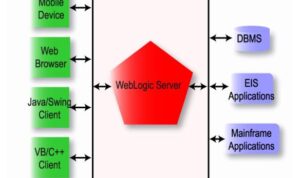Dedicated hosting, a cornerstone in the realm of web hosting, offers unrivaled performance and security for websites. Let's delve into the intricate world of dedicated hosting, exploring its features, benefits, and essential considerations.
What is Dedicated Hosting?
Dedicated hosting refers to a type of web hosting where a client leases an entire server solely for their website or application. This means that the server's resources, such as CPU, RAM, and storage, are exclusively dedicated to the client's use.
Key Features of Dedicated Hosting
- Full Control: Clients have complete control over server settings, software installations, and security configurations.
- High Performance: Dedicated resources ensure faster loading times and better overall performance.
- Enhanced Security: With no other websites sharing the server, dedicated hosting offers increased security and protection against potential threats.
- Scalability: Clients can easily scale resources up or down based on their requirements.
Dedicated Hosting vs. Shared Hosting
In contrast to shared hosting, where multiple websites share resources on the same server, dedicated hosting provides exclusive use of the server for a single client. This leads to better performance, security, and control over the server environment.
Industries Benefiting from Dedicated Hosting
- E-commerce: Online stores with high traffic and complex operations benefit from the dedicated resources and reliability of dedicated hosting.
- Large Enterprises: Organizations with extensive data processing needs and strict security requirements often opt for dedicated hosting for optimal performance and control.
- Media and Entertainment: Streaming services, gaming platforms, and media websites that require consistent uptime and fast loading times can benefit from dedicated hosting.
Benefits of Dedicated Hosting
Dedicated hosting offers numerous advantages for businesses and individuals looking for reliable and secure hosting solutions. Let's explore some of the key benefits below.
Improved Website Performance and Security
Dedicated hosting provides exclusive access to server resources, ensuring optimal performance for your website. With no sharing of resources with other users, your site can handle high traffic volumes without slowdowns or performance issues. Additionally, dedicated hosting offers enhanced security features, such as dedicated firewalls and regular security updates, protecting your website from potential threats and attacks.
Scalability and Customization Options
One of the significant advantages of dedicated hosting is the scalability it offers. As your website grows, you can easily upgrade your server resources to accommodate increased traffic and data storage needs. This flexibility allows you to adapt your hosting plan according to your requirements, ensuring your website runs smoothly at all times.
Moreover, dedicated hosting allows for customization options, enabling you to configure your server settings and software to meet your specific needs and preferences.
Features of Dedicated Hosting
When opting for dedicated hosting, users can enjoy a range of features that cater to their specific needs and requirements. Let's explore some key features offered by dedicated hosting providers.
Managed vs. Unmanaged Hosting
- Managed Hosting: In this type of plan, the hosting provider takes care of all technical aspects of server management, including software updates, security patches, and monitoring. This allows users to focus on their core business without worrying about server maintenance.
- Unmanaged Hosting: With unmanaged hosting, users are responsible for managing the server themselves. This gives them more control and flexibility, but also requires technical expertise to handle tasks such as software installations, security configurations, and troubleshooting.
Importance of Resources
Resources such as bandwidth, RAM, and storage play a crucial role in dedicated hosting as they directly impact the performance and scalability of your server. Here's why these resources are important:
- Bandwidth: Determines the amount of data that can be transferred to and from the server. Higher bandwidth allows for faster loading speeds and better user experience.
- RAM (Random Access Memory): Essential for running applications and processes smoothly. Sufficient RAM ensures optimal performance and multitasking capabilities.
- Storage: Refers to the amount of disk space available for storing files, databases, and other data. Sufficient storage is necessary to accommodate your website's growth and data requirements.
Setting Up Dedicated Hosting
When setting up a dedicated hosting server, there are several important steps to consider to ensure a smooth and secure process.
Choosing the Right Dedicated Hosting Provider
- Research different hosting providers to compare their services, pricing, and customer reviews.
- Consider your specific needs such as bandwidth, storage, and scalability options.
- Look for providers that offer 24/7 customer support and reliable uptime guarantees.
- Check for any additional services or features offered by the hosting provider.
Implementing Essential Security Measures
- Install a firewall to protect your server from unauthorized access and malware attacks.
- Regularly update your server's operating system and software to patch any vulnerabilities.
- Use strong passwords and consider implementing two-factor authentication for added security.
- Enable encryption for data transmission to protect sensitive information.
- Regularly back up your data to prevent loss in case of a security breach.
Cost Considerations of Dedicated Hosting
When considering dedicated hosting, it is essential to understand the various costs associated with this type of hosting. From server hardware to software licenses, there are several factors that can impact the pricing of dedicated hosting plans. Here, we will break down the typical costs, explain factors that affect pricing, and provide tips on optimizing costs when selecting a dedicated hosting plan.
Server Hardware Costs
One of the primary costs associated with dedicated hosting is the server hardware itself. This includes the physical server, storage drives, memory, and other components that make up the server infrastructure. The quality and specifications of the hardware can significantly impact the price of a dedicated hosting plan.
Software Licenses
Another cost consideration is software licenses. Depending on the operating system, control panel, and other software applications needed for your server, you may need to purchase licenses. These costs can add up, so it's essential to factor them into your budget when selecting a dedicated hosting plan.
Bandwidth and Data Transfer
Bandwidth and data transfer limits are also crucial factors in determining the cost of a dedicated hosting plan. Be mindful of how much bandwidth your website requires and ensure that the plan you choose offers enough data transfer to meet your needs.
Exceeding these limits can result in additional charges.
Managed Services
Opting for managed services, such as server monitoring, backups, and security updates, can incur extra costs. While these services can provide valuable support and peace of mind, they can also increase the overall price of your dedicated hosting plan. Consider your technical expertise and requirements when deciding whether to include managed services.
Customization and Add-ons
Many dedicated hosting providers offer customization options and add-ons that can enhance your server's performance or features. While these additions can be beneficial, they often come with additional costs. Evaluate your needs carefully to determine which customizations and add-ons are worth the extra expense.
Outcome Summary
In conclusion, dedicated hosting stands as a beacon of reliability and customization in the digital landscape. By understanding its nuances and advantages, individuals and businesses can harness the full potential of their online presence.
Quick FAQs
What resources are crucial in dedicated hosting?
Bandwidth, RAM, and storage are essential resources in dedicated hosting, ensuring optimal performance and scalability.
How does dedicated hosting differ from shared hosting?
Dedicated hosting provides exclusive use of a server, while shared hosting involves multiple websites sharing resources on a single server.
What are the advantages of managed dedicated hosting?
Managed dedicated hosting offers proactive server monitoring, maintenance, and support, relieving users of technical tasks.
How can one optimize costs when selecting a dedicated hosting plan?
Optimizing costs involves assessing your resource needs accurately and choosing a plan that aligns with your requirements without unnecessary extras.







